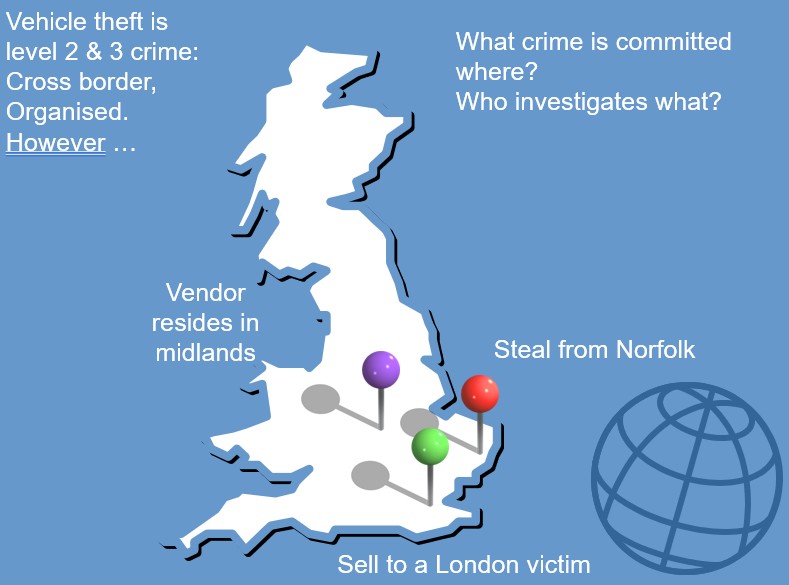Understanding Vehicle Theft Data: Limitations and Challenges in the UK
The DVLA figures presented offer a comparative view of car*-taking offences between 2023 and 2024. However, these statistics should not be regarded as definitive. The current state of vehicle theft recording in the UK remains inconsistent, incomplete, and lacking in depth, despite previous recognition of the importance of accurate data, such as that expressed by the 2019 Vehicle Crime Taskforce.
*‘cars’ were extrapolated from the ‘vehicle’ file – see below.
The data used is sourced from DVLA records, which classify vehicles as ‘stolen’. The description ‘stolen’ oversimplifies the reality. Some entries in the DVLA database will include vehicles subject to fraud, misreported incidents. Past analysis by Kent Police estimated that approximately 30% of reported vehicle ‘taking’ was linked to fraudulent activity.
This comparison assumes no significant changes in how the DVLA recorded these incidents over the two years in question, though this cannot be independently verified.
It is important to note the following caveats:
Vehicle Scope: This analysis is limited to cars, identified using the DVLA’s “Body Style” classification. Other vehicle types – such as mopeds, hearses, HGVs, and quads – were excluded using a consistent methodology across both years. (See: DVLA Data Sorting – Body Styles)
It is quite staggering to note that many records lacked basic information, even constabulary! However, vehicle makes/models were not always present, and when they were, the entries were inconsistent – seemingly the subject of police manual input – see ‘Police Record Gaps’ below.
Historical Variation. General ‘taking’ statistics from 1993, the variations and sources, can be found here. Substantial variance may arise due to the use of ‘all vehicle’ data and/or ‘car’ information.
Incomplete DVLA Records: Not all police reports of LoS (lost or stolen) vehicles are passed on to the DVLA. The figures will therefore underrepresent the true scale of the issue. Some explanations can be found here – DVLA ‘Missing’ Records. Once again, it is concerning ‘real time’ interaction does not occur, that there remains a disconnect between DVLA, Police, and Vehicle Provenance (VP) companies.
Police Record Gaps: Discrepancies also exist within police reporting systems. Some records are missing, ambiguous, or improperly categorised, see: Police Missing or Confusing Records. The situation appears overly complex, lacking consistency.
Police Scotland’s response highlights issues which appear to be common throughout UK constabulary reporting systems. ‘The make/ model/ recovery details are not however mandatory fields.‘
Information about Crime Offence Codes and Data Sets can be read here.
Fraud Misclassification: Some vehicles are falsely reported as stolen for fraudulent purposes (e.g., insurance or debt avoidance). Others may be taken by fraudulent means but classified as theft. More about false allegations of theft can be read here.
Why would the incidence of fraudulently obtained reports of vehicle theft be any less than 30%, identified by a constabulary 20-odd years ago? Read more here.
Data Quality and Entry Errors: There are notable concerns around manual data entry. Variations in vehicle descriptions, spelling inconsistencies, and unspecified notifying police constabularies (439 cases in 2024 lacked this information) suggest a lack of standardisation. Additionally, key information is often not held in formats that allow for efficient retrieval or analysis under Freedom of Information (FoI) cost limits, indicating many constabularies may not have the internal resources to perform such tasks.
Nonetheless, assuming consistent shortcomings across both years, the data serves as a useful basis for police constabulary activity & comparison.
LoS Recoveries

It is also important to consider the complexity of recovery data. There should be no assumption a stolen vehicle is recovered by the same constabulary that recorded the taking. For example, in cases involving cloned or fraudulently obtained vehicles, those responsible may intentionally operate across jurisdictions to complicate investigations – for instance, stealing a vehicle in one area, selling it in another, and involving a buyer from a third. As a result, some constabularies may benefit from the efforts of others. Possibly this evens out across the UK.
It is also the case that the police commonly overlook updating the PNC with recovery information.
As for the recovery condition of a car when found, police statistics about this are few and far between. Yet all too often (increasingly), what is recovered is no more than a collection of parts or stripped shell.
This further underscores the need for more coherent, centralised, and consistent data practices to support effective analysis, policymaking, and public understanding of vehicle crime in the UK.
